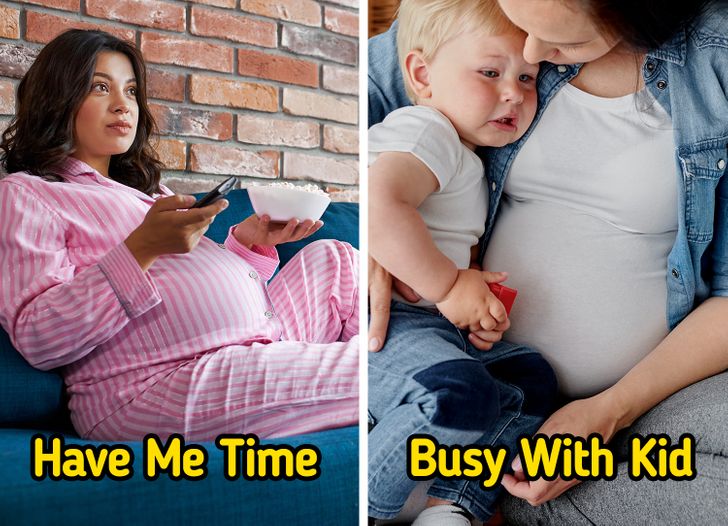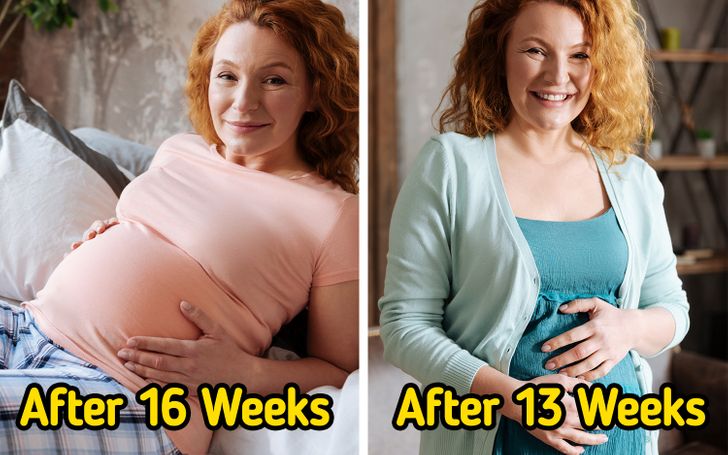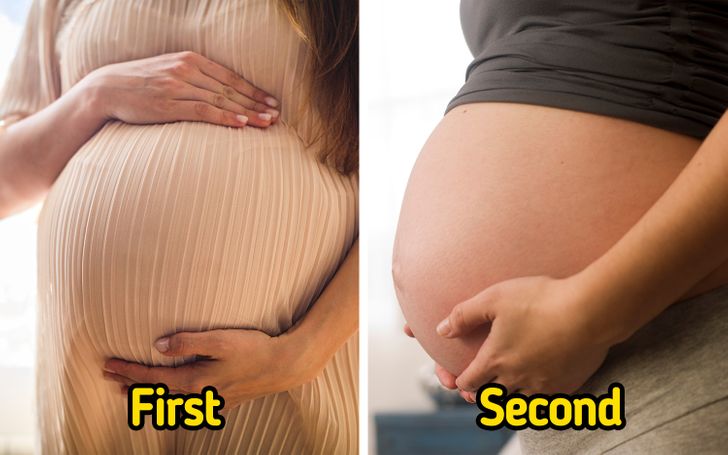Also if you injure your back in the early stages of 1st or 2nd pregnancies you may not be able to have X-rays to ascertain the severity of the injury.
As your bones get softer as you move along your pregnancy your (injury) may get worse to the point you may not be able to get a great deal of therapy done to help your back until after you give birth.
Take care of any injuries asap or as your bones re-strengthen after birth you may develop a
permanent injury.
10 Things Every Mother Needs to Know Before Having a Second Child
During pregnancy, your uterus alone has to expand nearly 500 times its size in 9 months and then go back to its original dimensions. It’s not as if the brain is spared either, as many women even report memory impairment and confusion during pregnancy. But even so, many of us willingly go through it a second or even a third time. But remember, each pregnancy is different — the second one even more so.
Bright Side collated some important points on how your second pregnancy may differ from your first. Keep in mind, each pregnancy is a special journey.
1. Second pregnancies can tire you out more.
Remember your first pregnancy and how energetic you felt? This was a special time in your life and you got plenty of pampering from your partner, friends, and family. But in your second pregnancy, you already have the responsibility of caring for your first child, and this means you may not get as much time for yourself as you did before.
Plus, your body is being flooded with a hormone called progesterone, which is readying your body for all the physical changes of birth and delivery. The side effect of this hormone is fatigue, so you may feel waves of exhaustion more the second time around.
2. The delivery may take a different route.
The birthing experience may also differ from your first to your second pregnancy. In fact, most women agree that labor is often reduced in the second pregnancy and goes on getting easier with each consequential birth. Your experience with the first birth helps, and you may be better equipped the second time around.
On the flip side, if you had a C-section the first time around, chances of a VBAC, as in “vaginal birth after cesarean,” are pretty low. However, it differs from case to case.
3. You’ll feel the baby’s movements much earlier.
The baby’s first movements are called quickening and, usually, in first-time pregnancies, you can feel them between the sixteenth and the twenty-fifth week for the first time. In the second pregnancy, you can feel the baby’s movements as early as 13 weeks, more because you already know what they feel like.
4. The bump may be visible and bigger sooner.
For many women pregnant for the first time, baby bumps often appear in the second trimester, and you don’t typically show for the first 3 months at all. But during a second pregnancy or any after that, the bump shows up earlier.
Experts say it’s because the abdominal muscles have stretched a bit and they may not have returned to their original size. So hiding a second pregnancy isn’t as easy as keeping the first one under wraps. Plus, this can also mean more stretch marks.
5. Morning sickness could either be absent or a lot stronger.
You can never tell with morning sickness, and things during your second pregnancy may not be the same as they were for your first.
For some women, the dreaded morning sickness never arrives. For others, it’s way worse than the first time around.
6. Breast tenderness may be reduced or absent.
First pregnancies usually come with so much breast tenderness, bras become a mortal foe. But for many women, second pregnancies bring no such extreme sensitivity in their breasts. And the size of the breasts doesn’t increase all that much the second time around.
7. Fewer food aversions may make it easier.
You may also find that in your second pregnancy, your food cravings or aversions are not as pronounced as they were during the first time. On the flip side, you may experience a whole new set of food aversions or cravings.
8. You may carry the baby lower.
After a single pregnancy, the abdominal and pelvic muscles have weakened. You may have carried high in your first pregnancy, but in your second one, you may carry the baby lower as the muscles are not as limber as before.
This, in turn, can cause pressure and pain in the pelvic region. Pelvic tilts and Kegels can help ease the discomfort.
9. Post-partum contractions could be more intense and painful.
Once you have delivered your baby, the uterus has to work hard to go back to its original size. And as it contracts, you get post-partum contractions or after pains. You may have felt a mild version of these similar to menstrual cramps after the birth of your first.
But these get more severe in second pregnancies and any after that. In fact, you may feel them the most while you breastfeed. Studies point out that in severe cases with multiple births, pain management may become necessary to ensure healthy breastfeeding.
10. Second pregnancies may result in more back pain.
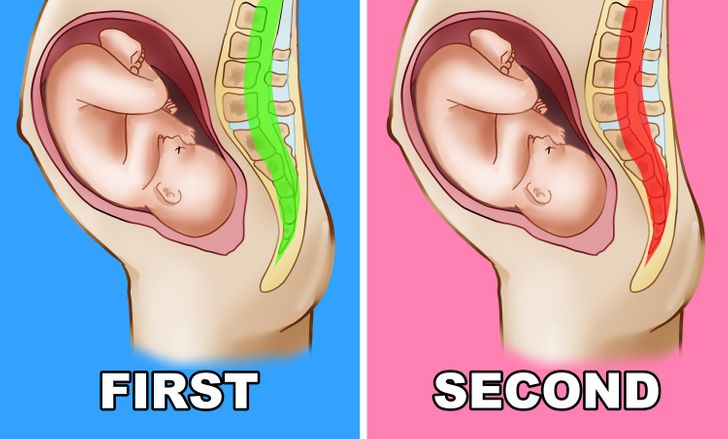
One of the many hormones produced in your body during pregnancy is relaxin. Its job is to prepare your body to give birth by loosening your muscles and joints. You may have felt niggling aches and pains, especially in your back during your first pregnancy.
But in your second pregnancy, or any thereafter, the pain is likely to become worse. The culprit is relaxin again, which is loosening already loosened joints and muscles even more, causing you discomfort.
Have you heard of the study that says second children are more likely to be troublemakers? Would you agree? Share your first and second pregnancy stories with us in the comment section below.
Subscribe to our podcast on Spotify or Apple podcasts to enjoy our best stories and give a real treat to your ears.
Comments
Related Reads
19 Crazy Things That Could Only Happen in China

13 Phrases Parents Use That Can Push a Kid to Seek Therapy in the Future
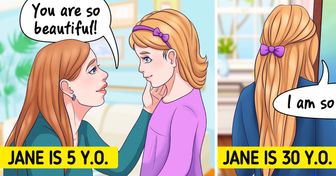
21 People Share the Eerie Stories That Made Them Stop Cold in Confusion

15 People Who Know How to Impress Others, Leaving Us All Saying, “Wow!”

7 Facts About the Female Body That Very Few People Know About
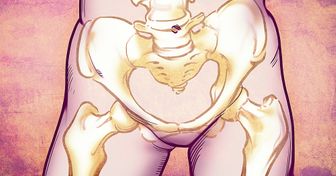
People Decided to Share Pics of Their Wives, and We Couldn’t Love Them More

15 True Stories Where Life Threw a Curveball

My Best Friend of 20 Years Invited Me to Her Wedding, and It Was the Worst Day of My Life
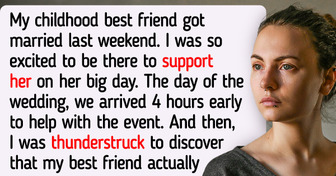
16 Vacations That Fell Apart Before the Sunscreen Was Even Uncapped
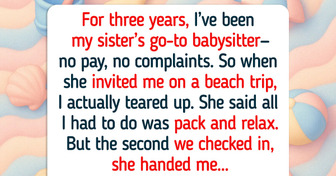
11 Plot Twists That Could Even Make Hollywood Jealous

Pierce Brosnan’s Wife Stuns People With Her Transformation During Her Latest Appearance

15+ Stories That Prove Moms’ Love Tank Never Runs Empty

